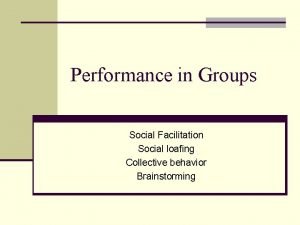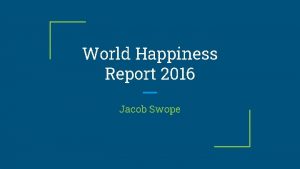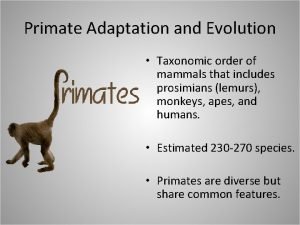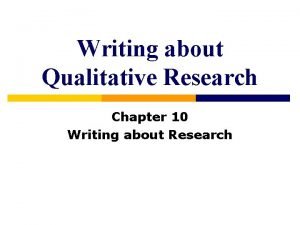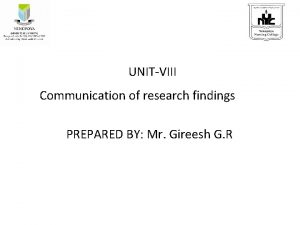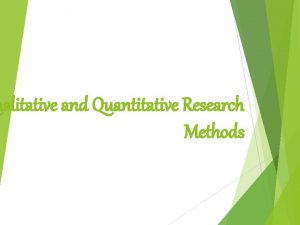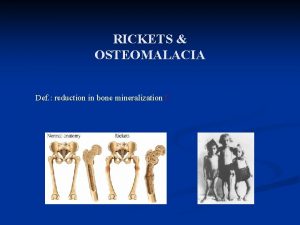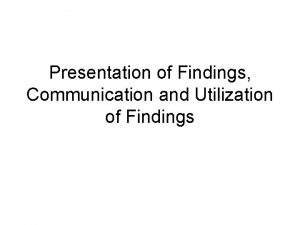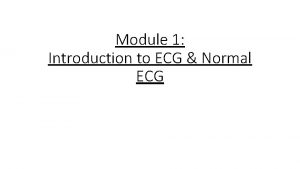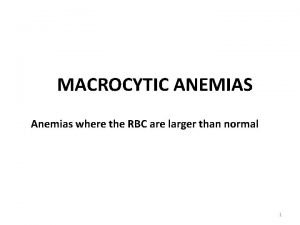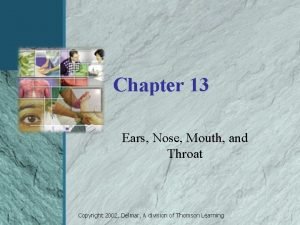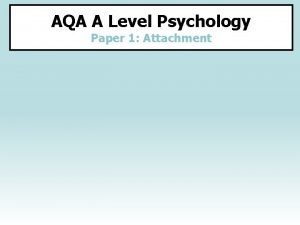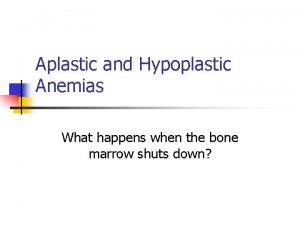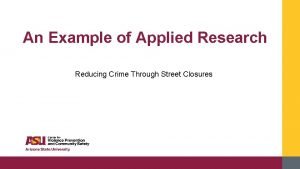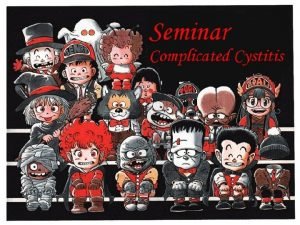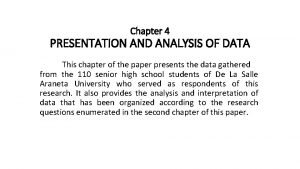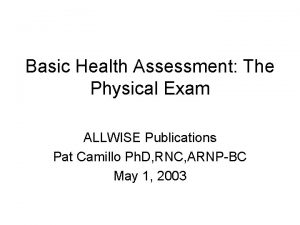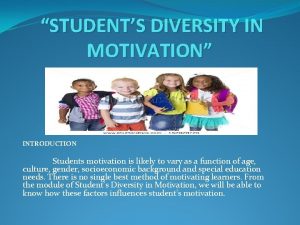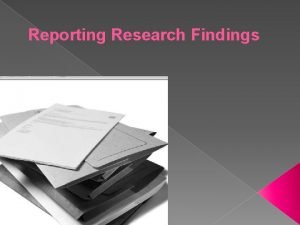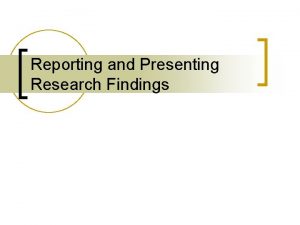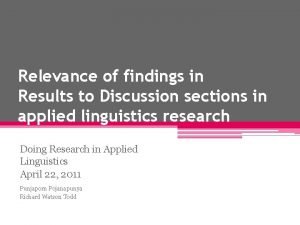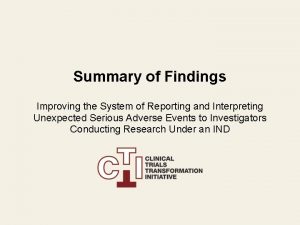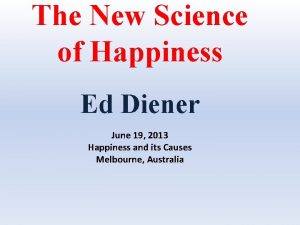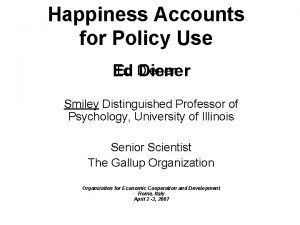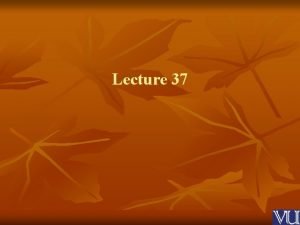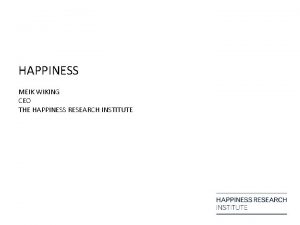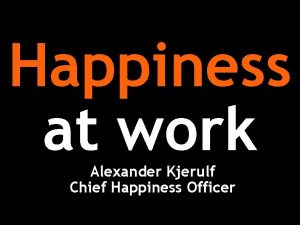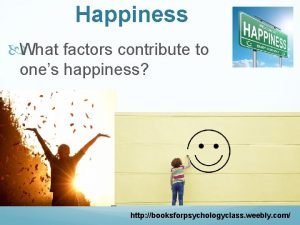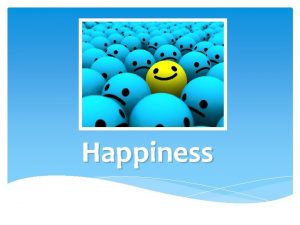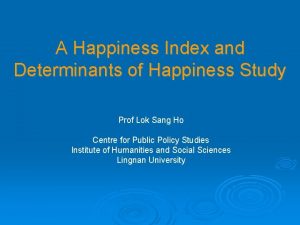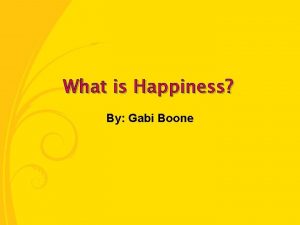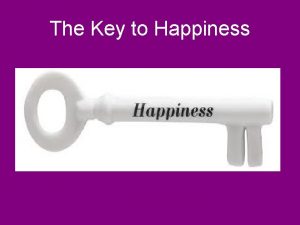New Findings On Happiness Ed Diener First World




















































- Slides: 52

New Findings On Happiness Ed Diener First World Congress on Positive Psychology Philadelphia, USA June, 2009

WELCOME! First World Congress of Positive Psychology

Subjective Well-Being “Happiness” Myths New Directions

Themes Today 1. Adaptation is often partial 2. Circumstances matter 3. Happiness is not a single thing -- Wanting versus liking 4. Outcomes of well-being are as important as the causes

5. Cultural Differences 5: 30 Today -- Collected Works of Ed Diener 3 Volumes Springer Publishing

1. Adaptation is often partial, not complete

The Brickman and Campbell Myths • Lottery winners no “happier” • Spinal cord injured no less happy

Lottery Winners Brickman and Campbell Smith and Razzell Oswald and Winkelman

Life Satisfaction and 100 Percent Disability (Rich Lucas)

Daily Moods of 20 -year Old “Harry”

Also There are Large Individual Differences in Adaptation!

Adaptation to Marriage (Lucas)


Implications Huge individual differences: e. g. , Marriage Paraplegia etc. What people do and think matters Positive psychology is in business!

An implication of incomplete adaptation: 2. Circumstances are Important to Well-being

We must have Positive Organizations & Institutions!

The Power of the Situation • Milgram; Zimbardo • Good Samaritan studies • Societal differences


3. Happiness is NOT a Single Thing

“Germs” • Viruses • Parasites • Molds • Bacteria

World Countries & Positive Affect 0. 00 to 0. 65 to 0. 75 to No data 0. 86 World Countries & Negative Affect 0. 00 to 0. 20 to 0. 25 to 0. 41 No data

National Predictors of Well-Being Life Satisfaction Positive Engagement Income Social support Conveniences Learning & flow Basic needs Public trust

Does Money Make Us “Happy”?

Declining Marginal Utility of Money

Wanting Vs. Liking • Money is across the world substantially associated with life satisfaction, r =. 44 • Is only weakly correlated with Positive Feelings, r =. 17

Examples of Wanting Vs. Liking (Berridge) • Drug addiction • Jack

“Jack”

Materialists Happiness is having what we want Positive Psychologists Happiness is liking what we have

Wanting Versus Liking -- Two Types of “Happiness” • Having what one wants – Life Satisfaction • Liking what one has – Positive feelings

Ed: Learning to Desire What He Will Like • Enjoyment Hiking & swimming, data analyses, family & friends, reading, new research ideas, movies • Should Ed? Be APA president, be a dean, be a department head

Lesson for Positive Psychologists Learn to desire what you will like having Educate others about this!

Why Do We Want Money? • Basic needs • Status and self-esteem • Advertising

4. Outcomes of Well-Being Is it functional to be happy? -- There are skeptics!


Benefits of Well-being: • Social Relationships • Health • Work • Spirituality

Happinss and Social Success: Headed for Divorce?

Ed & Carol 40 years later

Psychologists Happy live about 5 years longer (Sarah Pressman)

Work • Higher income • Creativity • Better organizational citizens

Spirituality George Vaillant Positive feelings that connect people to things larger than themselves Love, affection Wonder, awe Gratitude Respect

Professor Evelyn Satinoff • I don’t care if my kids are happy • I want them to achieve a lot and help the world!

Well-Being is Good for People Beyond Just Feeling Good • • • Relationships Health Work Success Citizenship Spirituality

Too Happy? Are negative feelings ever beneficial? Can someone be too “happy”?

1. Take-Home Message Benefits of Well-Being • Well-being aids effective functioning! • Issue: Can we be too happy? What is the optimal level?

2. Take-Home Message Partial Adaptation We do not completely adapt to everything! Societies and organizations matter to wellbeing and positive psychology! We need to examine individual differences, not just averages!

3. Take-Home Message Diverse Types of Well-Being “Happiness” is NOT one thing Differentiate the types! Getting rid of negative feelings is not the same as getting positive feelings Money more related to wanting than liking (Satisfaction versus positive feelings) Educating people to desire what they will like

Thank You!!! Questions? Discussion?


Promising Future Directions A. Optimal levels of well-being B. Speeding and slowing adaptation C. Moving beyond averages “Does marriage increase wellbeing? ” When, who, why D. What creates wanting versus liking?

Complete Wealth Social Support Trust Security/safety Trust Personal Mastery & strengths Virtues Life satisfaction Positive feelings Positive spirituality No chronic negative

Flaubert’s Error To be stupid, selfish, and have good health are three requirements for happiness, though if stupidity is lacking, all is lost. Gustave Flaubert

Telomeres and Aging Long is good Don’t “come unravelled”
 Diener 1976 trick or treat
Diener 1976 trick or treat Diener plasma cleaner
Diener plasma cleaner Ingrid diener
Ingrid diener Kaggle world happiness report
Kaggle world happiness report Old vs new world monkeys
Old vs new world monkeys Coffee new world or old world
Coffee new world or old world Qualitative paper example
Qualitative paper example Chest expansion test
Chest expansion test Research findings example
Research findings example Communication of research finding
Communication of research finding Characteristics of research methodology
Characteristics of research methodology Suprasternal notch location
Suprasternal notch location Osteopenia of prematurity ppt
Osteopenia of prematurity ppt Results and discussion
Results and discussion Pneumothorax auscultation findings
Pneumothorax auscultation findings Qualitative vs quantitative
Qualitative vs quantitative Presentation of results
Presentation of results Abnormal percussion sounds of abdomen
Abnormal percussion sounds of abdomen Acute interstitial nephritis urine findings
Acute interstitial nephritis urine findings Ecers summary of findings sample
Ecers summary of findings sample Are there p waves in afib
Are there p waves in afib Difference between megaloblastic and pernicious anemia
Difference between megaloblastic and pernicious anemia Macrocytic anemia
Macrocytic anemia Vwf deficiency labs
Vwf deficiency labs Semi-tabular presentation
Semi-tabular presentation Nose assessment normal findings
Nose assessment normal findings Law of continuity psychology attachment
Law of continuity psychology attachment Hereditary spherocytosis
Hereditary spherocytosis Pathophysiology of aplastic anemia
Pathophysiology of aplastic anemia Polycythemia differential diagnosis
Polycythemia differential diagnosis Example of applied research
Example of applied research What do the findings of roper's experiment suggest?
What do the findings of roper's experiment suggest? Urethitis
Urethitis Hyperphosphatesia
Hyperphosphatesia Announcing your findings
Announcing your findings Intussusception x ray findings
Intussusception x ray findings Desired results parent survey
Desired results parent survey Chapter four data presentation and analysis
Chapter four data presentation and analysis Jesus seminar findings
Jesus seminar findings Focused gastrointestinal assessment
Focused gastrointestinal assessment Translating research findings to clinical nursing practice
Translating research findings to clinical nursing practice Diagnostic positions test normal findings
Diagnostic positions test normal findings Normal percussion of abdomen
Normal percussion of abdomen Seattle longitudinal study findings
Seattle longitudinal study findings Grade summary of findings table
Grade summary of findings table Module 21 students diversity in motivation
Module 21 students diversity in motivation Reporting research findings
Reporting research findings Presenting research findings
Presenting research findings Findings and discussion
Findings and discussion Myelofibrosis lab findings
Myelofibrosis lab findings Abnormal findings
Abnormal findings Summary of findings
Summary of findings How to describe results
How to describe results
